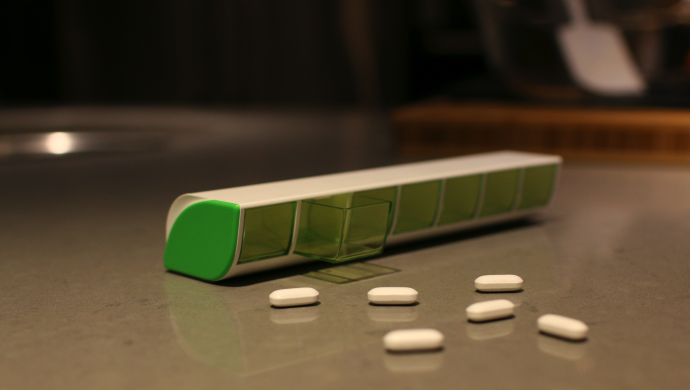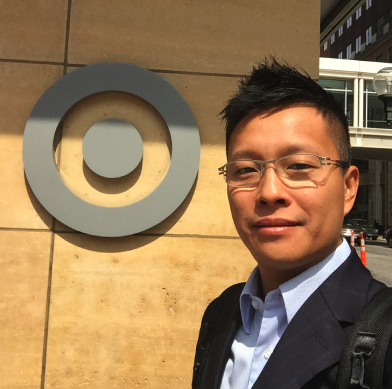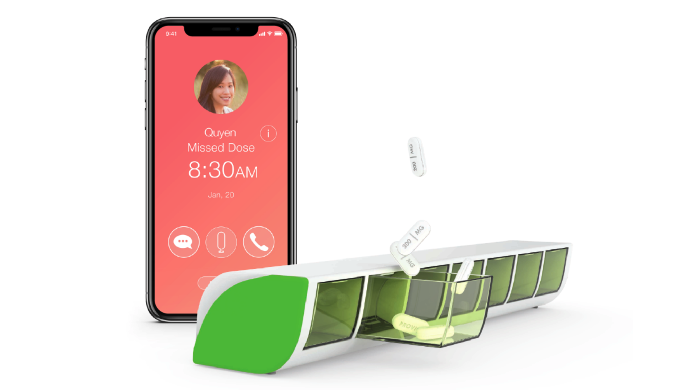The pill drawers in Tricella are held in place by magnets which make them easy to slide open for people who have arthritis, but when closed, are secure enough to help prevent accidental openings

Tricella smart pillbox
When he was just 15 years, Daniel Weng’s ageing parents, who were living with him in California, wanted to move back to spend rest of their lives in their home country Taiwan, as they had developed conditions that required medication.
After their return, for Weng and his siblings, who remained in the US city to continue their education, the routine long-distance calls with parents would start off with them asking how their health was, and if they were following the doctor’s prescriptions religiously. However, over time Weng started to feel that parents were getting nagged by the regular calls and questions about medication by their children. But Weng had no other option, but to insist on his dad and mom to continue medication without fail.
“Taking this as a starting point, I wanted to build a thoughtful user experience that encompassed pleasant family interactions with patients. And this was the starting point of my entrepreneurial journey. This eventually led me to the creation of Tricella,” Weng told e27 over a Skype call.
Based in Mountain View and Taipei, Tricella is an Internet of Things startup, which has designed a smart pillbox that sends you notifications if your loved ones forget to take their pills. It also features a messenger for you to send them personal reminders, too.
Tricella — which means “three cells”(it embraces three core values: family, health and education) — was founded in 2014 by Weng, a Sociology graduate from the University of California Los Angeles (UCLA). Tricella is the result of years of hard work and research. When he designed the product, Weng wanted a form factor which was familiar to the end user.
Also Read: IoT should be like the air we breathe: UnaBiz on making the technology accessible to everyone
“It’s important that we do not force a complete change in user behaviour when we introduce a new concept. Users still fill the pillboxes as they would with any traditional pillbox. They sort their pills into the pill drawers based on what they need to take a given dose interval,” he said, narrating his journey.
The pill drawers in Tricella are held in place by magnets which make them easy to slide open for people who have arthritis, but when closed, are secure enough to help prevent accidental openings. The pillbox can hold more pills than a traditional arthritis-friendly extra-large capacity pillbox while having a smaller footprint making it very portable, Weng claims.
“We have sensors in each compartment that can detect individual openings of the pill drawers. This also gives us the scalability to add more features that are in our roadmap to improve user experience,” he explained. “The pillbox connects to smartphones and tablets over Bluetooth low energy (BLE) to communicate with our app. By connecting to smartphones, our product fits better in various lifestyles, because many people need to take pills when they are away from home.”
A US$300 billion market
Drug non-adherence is a US$300-billion-per-year problem. It accounts for nearly 10 per cent of healthcare costs in America, that’s approximately US$300 billion in avoidable costs. The cost is not just due to wasting medication, but disease progression and re-hospitalisation rates are also attributed to non-adherence
Drug adherence has a near one to one correlation with health outcomes. For example, if a heart failure patient forgets to take his/her pills in the morning, he/she can potentially have adverse reactions by afternoon. Or, if an organ transplant patient is non-adherent, his/her body may reject the organ, and this will have a profound impact over his health outcome.
“This is the problem we try to address with Tricella. With this, we aim to replace the existing most popular 7-day/compartment pillboxes in the market,” Weng indicated.
Studies suggest that text messaging alone can significantly increase drug adherence. And family involvement in patient health regimens is likely to increase patient outcomes. Tricella has gone beyond the basics by creating a user experience that incorporates automated reminders for patients/pill users and family interaction. For instance, when a user needs to take his/her pill at 8:00am, he/she will receive a reminder in every 15 minutes. If he/she fails to take it at the one-hour mark (9:00am), an escalated notification will be sent to family members.
“We didn’t stop there. The family members, who have also downloaded the app, will receive a notification screen with three simple call-to-action buttons; they can text, record, or send audio message, or call the users directly through the app. It is important to reduce the friction to respond to drive engagement of family/caregiver with patients/pill users,” Weng elaborated.
For those who need to take pills more than once a day can use multiple pillboxes. The app can show progress over time via the history view inside the app.
But what if someone opens the pill drawer and closes it?
“Well, let me ask you a counter question: what if the person opens and takes out the pills and throws it away? That’s not the market we are serving, we can only help those that want to improve their quality of life by adhering to drug regiments, but need extra help,” he counters.
Building a wearable device startup

Tricella Founder Daniel Weng
In his previous avatar, Weng led the North America efforts in spearheading new commercial channels for Foxconn’s Mobile Group. He was responsible for developing Google, Amazon, Microsoft, Blackberry (RIM), nVidia and also other strategic accounts grossing over US$2.2 billion, annually. He also worked closely with Foxconn’s venture arm for due diligence and deal flow.
Prior to Foxconn, he was a field sales team lead for a 2nd tier telecommunications company that served the SMB (small, medium businesses).
“Following Foxconn, I co-founded a wearable startup called Phyode (now Rooti Labs). We made a wearable (bracelet) that can detect how well a person’s autonomic nervous system was performing, and also his/her emotional susceptibility. It can also infer how a person is breathing, so we built a rhythmic breathing coach that can help regulate the autonomic nervous response,” he said.
“It was because of Phyode I realised that wearable devices have their limitations. The data they collect can be extensive. However, the correlation between the data and health outcomes can be quite low. Detecting biometric data can tell you what state you are in, but it rarely can tell you how your body got there,” Weng went on.
Also Read: IoT is growing exponentially, and Asia Pacific takes top market share
Moreover, if it’s not being worn, wearables have zero value. Studies suggest that consumers tend to abandon their wearable devices by the six-month mark. In most cases, biometric data in the hands of consumers are often rendered useless. They need meaningful information that can be digested and it needs to be actionable.
The startup has a strong engineering team, in addition to in-house design and marketing communications teams. The designs are done in California while the product engineering and execution is done in Taiwan. The final product is manufactured in China.
The smart pillbox is just a starting point, and the startup will continue to build its portfolio of products and services that will contribute to its “pro-active” commerce platform. “This will expand beyond medication and supplements. Our strategy is to eventually have our pillbox subsidised by the payers in healthcare industry — by providing personalised medicine and better out-patient care.”
As of now, it targets markets such as North America (Canada and the US), Europe, and APAC. “So far, we have already launched in North America with Target Corp, one of the largest mass market retailers, and Amazon. We have recently launched in Canada via Amazon Canada. In Taiwan, we launched with the nation’s most popular premium Apple Reseller, Studio A. We are continuing our market expansion in Asia this year,” he said.
Big Data, big opportunity
While its flagship product will continue to be Tricella, at least for the next few years, the startup wants to go beyond as it sits on loads of Big Data of patients.
“Data is the core to our business. However, we are not to sell the data. By gaining insights into our users, we can continue to provide value-added services to our users. This is extremely important because IoT products are inherently negative revenue generators. What I mean is the longer the user uses the product, the more the money a company spends. Because there are costs associated with maintaining an app (man power), server storage, customer service etc,” he observed.
A universal product, Tricella doesn’t want to restrict itself to its existing markets. Said Weng: “Consumer behaviour is strikingly similar in all the markets we operate in. However, it seems like the Asia markets prescribe more medication that is to be taken throughout the day than the US market. We target markets that have high adoption rates for smartphones to start off in.”

Japan and Taiwan market are also unique as they have a rapid growth in the ageing population. Birthrates are low in both these countries, and private and public institutions are trying to find better ways to keep the ageing population living independently in their own homes. “It’s a huge opportunity for us, because if we can help ensure people are able to control and slow down disease progression, they can continue to reside in their homes independently longer. This helps drive the social and healthcare cost lower for the government,” he shared.
A bootstrapped startup, Tricella said it has been receiving lots of inbound interests from many investors. However, Weng feels that it is important to be disciplined.
“I believe if a startup is not trying to raise funds, it needs to focus on its core business. Fundraising is extremely distracting to a business and at times, it can be detrimental to the business, too.”he noted.
“ However, this doesn’t mean we are not open to the idea of outside investment. When/if we do decide to raise a fund, we will want to work with strategic investors that will help us scale the business. I believe that investors and institutional VCs should be an extension to the team, if they don’t provide strategic value, it’s not wise to raise a fund with them,” he concluded.
The post Tricella’s smart pillbox sends you notifications if your loved ones forget to take pills appeared first on e27.